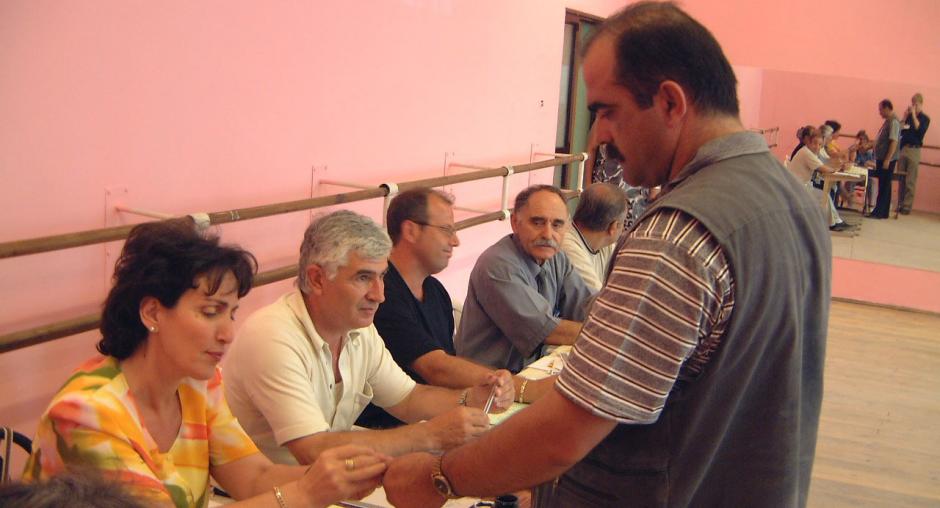Newsroom
Albanian elections: In remaining zones, third round highlights problems
TIRANA 23 July 2001

(Jens Eschenbaecher/OSCE)An election commission member marks a voter's thumb with ink during Albanian parliamentary elections, 24 June 2001. (Jens Eschenbaecher/OSCE) Photo details
TIRANA, 23 July 2001 (OSCE) - The two weeks leading up to yesterday's third round of Albanian parliamentary elections served to highlight remaining electoral deficiencies, concluded the International Election Observation Mission in a preliminary statement issued today.
"While I stand by our earlier conclusion that these elections as a whole have shown progress, I have to say I'm disappointed with developments leading up to the third round," said Nikolai Vulchanov, Head of the Observation Mission of the OSCE Office for Democratic Institutions and Human Rights (ODIHR).
"We can reconfirm some positive trends, notably the peaceful atmosphere and the decision by political parties to raise their complaints through legal channels," added Jenny Jones, Head of the delegation of the Council of Europe Parliamentary Assembly. "It is unfortunate, however, that some of the problems and concerns we identified in earlier rounds have not been adequately dealt with."
The international observers were particularly concerned with:
Election day, 22 July, was generally calm and passed without problems at most polling stations. However, very serious irregularities were witnessed by observers in certain constituencies.
"This Mission now comes formally to an end," said Soren Sondergaard, Co-Rapporteur for Albania of the Monitoring Committee of the Council of Europe Parliamentary Assembly. "But the election process stays under international scrutiny. If allegations are not properly dealt with, they can be brought to the European Court of Human Rights. Meanwhile our Committee's monitoring continues."
The final assessment of these elections will depend in large part on the conduct of voting still to come, the adjudication of appeals and redress of irregularities, and the process of allocating proportional mandates.
Mission information:
The International Election Observation Mission for the third round of the parliamentary elections in Albania is a joint undertaking of the OSCE Office for Democratic Institutions and Human Rights (ODIHR) and the Parliamentary Assembly of the Council of Europe. An OSCE/ODIHR Election Observation Mission with 10 election experts in the Tirana headquarters and 18 long-term observers deployed to the regions was established in late May to assess the legal framework, the election administration, the media environment, and conditions for the election campaign. For election day on 22 July, the International Election Observation Mission deployed some 50 short-term observers, including five parliamentarians from the Council of Europe's Parliamentary Assembly to monitor voting and counting procedures in polling stations and election commissions in all zones in which elections took place.
For further information, please contact:
"While I stand by our earlier conclusion that these elections as a whole have shown progress, I have to say I'm disappointed with developments leading up to the third round," said Nikolai Vulchanov, Head of the Observation Mission of the OSCE Office for Democratic Institutions and Human Rights (ODIHR).
"We can reconfirm some positive trends, notably the peaceful atmosphere and the decision by political parties to raise their complaints through legal channels," added Jenny Jones, Head of the delegation of the Council of Europe Parliamentary Assembly. "It is unfortunate, however, that some of the problems and concerns we identified in earlier rounds have not been adequately dealt with."
The international observers were particularly concerned with:
- The inability, even after three rounds of voting, to complete the election process and allocate the proportional seats, as well as the prospect this could continue for several more rounds;
- Irregularities in counting and tabulation that undermine confidence in the results in certain constituencies;
- The ineffectiveness of the appeals procedure in providing redress;
- Undue politicization of some Zone Election Commissions and Voting Centre Commissions, which has sometimes disrupted the election process; and
- In certain polling stations, blatant attempts at fraud through ballot stuffing and other manipulations -including by voting centre officials - in plain view of international observers.
Election day, 22 July, was generally calm and passed without problems at most polling stations. However, very serious irregularities were witnessed by observers in certain constituencies.
"This Mission now comes formally to an end," said Soren Sondergaard, Co-Rapporteur for Albania of the Monitoring Committee of the Council of Europe Parliamentary Assembly. "But the election process stays under international scrutiny. If allegations are not properly dealt with, they can be brought to the European Court of Human Rights. Meanwhile our Committee's monitoring continues."
The final assessment of these elections will depend in large part on the conduct of voting still to come, the adjudication of appeals and redress of irregularities, and the process of allocating proportional mandates.
Mission information:
The International Election Observation Mission for the third round of the parliamentary elections in Albania is a joint undertaking of the OSCE Office for Democratic Institutions and Human Rights (ODIHR) and the Parliamentary Assembly of the Council of Europe. An OSCE/ODIHR Election Observation Mission with 10 election experts in the Tirana headquarters and 18 long-term observers deployed to the regions was established in late May to assess the legal framework, the election administration, the media environment, and conditions for the election campaign. For election day on 22 July, the International Election Observation Mission deployed some 50 short-term observers, including five parliamentarians from the Council of Europe's Parliamentary Assembly to monitor voting and counting procedures in polling stations and election commissions in all zones in which elections took place.
For further information, please contact:
- OSCE/ODIHR Election Observation Mission in Tirana, +(355 4) 230979, -232523, -232524
- Jens-Hagen Eschenbächer, OSCE/ODIHR Spokesperson, +48-603 683 122 (mobile)
- John Hartland or Angus Macdonald, Council of Europe, +33 388 41 3243
